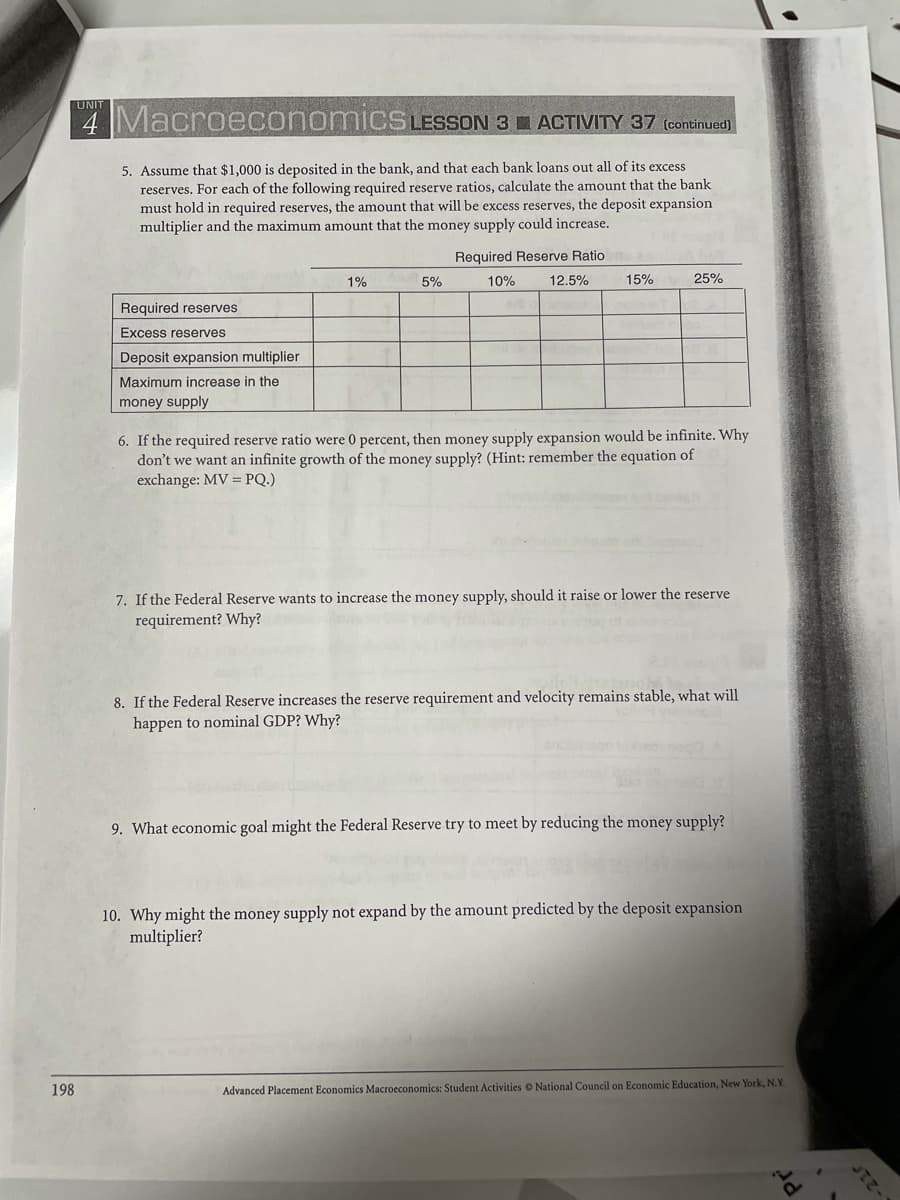5. Assume that $1,000 is deposited in the bank, and that each bank loans out all of its excess reserves. For each of the following required reserve ratios, calculate the amount that the bank must hold in required reserves, the amount that will be excess reserves, the deposit expansion multiplier and the maximum amount that the money supply could increase. Required Reserve Ratio 1% 5% 10% 12.5% 15% 25% Required reserves Excess reserves Deposit expansion multiplier Maximum increase in the money supply
5. Assume that $1,000 is deposited in the bank, and that each bank loans out all of its excess reserves. For each of the following required reserve ratios, calculate the amount that the bank must hold in required reserves, the amount that will be excess reserves, the deposit expansion multiplier and the maximum amount that the money supply could increase. Required Reserve Ratio 1% 5% 10% 12.5% 15% 25% Required reserves Excess reserves Deposit expansion multiplier Maximum increase in the money supply
Chapter14: Banking And The Money Supply
Section: Chapter Questions
Problem 3.4P
Related questions
Question
Just this page. Thank you 3

Transcribed Image Text:UNIT
4 Macroeconomics LESSON 3 I ACTIVITY 37 (contimusd)
5. Assume that $1,000 is deposited in the bank, and that each bank loans out all of its excess
reserves. For each of the following required reserve ratios, calculate the amount that the bank
must hold in required reserves, the amount that will be excess reserves, the deposit expansion
multiplier and the maximum amount that the money supply could increase.
Required Reserve Ratio
1%
5%
10%
12.5%
15%
25%
Required reserves
Excess reserves
Deposit expansion multiplier
Maximum increase in the
money supply
6. If the required reserve ratio were 0 percent, then money supply expansion would be infinite. Why
don't we want an infinite growth of the money supply? (Hint: remember the equation of
exchange: MV = PQ.)
7. If the Federal Reserve wants to increase the money supply, should it raise or lower the reserve
requirement? Why?
8. If the Federal Reserve increases the reserve requirement and velocity remains stable, what wil
happen to nominal GDP? Why?
9. What economic goal might the Federal Reserve try to meet by reducing the money supply?
10. Why might the money supply not expand by the amount predicted by the deposit expansion
multiplier?
198
Advanced Placement Economics Macroeconomics: Student Activities O National Council on Economic Education, New York, N.Y.
Expert Solution
This question has been solved!
Explore an expertly crafted, step-by-step solution for a thorough understanding of key concepts.
This is a popular solution!
Trending now
This is a popular solution!
Step by step
Solved in 3 steps

Knowledge Booster
Learn more about
Need a deep-dive on the concept behind this application? Look no further. Learn more about this topic, economics and related others by exploring similar questions and additional content below.Recommended textbooks for you


Essentials of Economics (MindTap Course List)
Economics
ISBN:
9781337091992
Author:
N. Gregory Mankiw
Publisher:
Cengage Learning

Brief Principles of Macroeconomics (MindTap Cours…
Economics
ISBN:
9781337091985
Author:
N. Gregory Mankiw
Publisher:
Cengage Learning


Essentials of Economics (MindTap Course List)
Economics
ISBN:
9781337091992
Author:
N. Gregory Mankiw
Publisher:
Cengage Learning

Brief Principles of Macroeconomics (MindTap Cours…
Economics
ISBN:
9781337091985
Author:
N. Gregory Mankiw
Publisher:
Cengage Learning

Principles of Economics (MindTap Course List)
Economics
ISBN:
9781305585126
Author:
N. Gregory Mankiw
Publisher:
Cengage Learning

Principles of Macroeconomics (MindTap Course List)
Economics
ISBN:
9781305971509
Author:
N. Gregory Mankiw
Publisher:
Cengage Learning

Principles of Economics 2e
Economics
ISBN:
9781947172364
Author:
Steven A. Greenlaw; David Shapiro
Publisher:
OpenStax